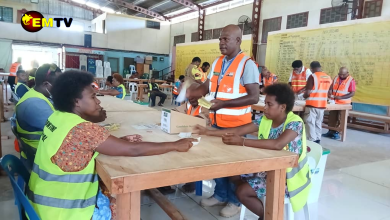DIRD WILL GO PAPERLESS NEXT YEAR
The Department of Implementation and Rural Development (DIRD) will no longer accepts paper expenditure reports of the provincial and district services improvement program (PSIP & DSIP) beginning next year as the department is going into paperless.
This follows the recent development, testing and successful piloting of their innovative Bilum Digital Platform currently being undertaken in some of the selected regions across the country.
The hassle of compiling thick files of PSIP and DSIP will eventually become a thing of the past.
DIRD Secretary Aihi Vaki said, during the official opening of the four days sub-national stakeholders consultative, testing, readiness and awareness workshop in Kimbe that the digital platform is basically being developed to the DIRD’s specifications (user name) as required by Administrative Guidelines and Financial Instruction of the 2019 and the Government of Papua New Guinea’s new Digital Transformation Policy 2021.
“In the long run we want to make sure acquittals are done paperless, some kind of templates are developed and established through the Bilum digital platform where you have a tracking of performances, assessment of their own five years development plans. This could be done on weekly or monthly basis,” Vaki said.
“In this era of rapid technological advancement, it is imperative that our government harnesses the power of digital tools to enhance service delivery and development. The strategic priority laid out in the Medium-Term Development Plan IV (MTDP IV) underlines our commitment to Strengthening good governance and efficient public service through digital government transformation and a digitally driven robust data collection, classification, and statistical system.
“It’s not just a vision; it’s our responsibility to transform this vision into a reality that benefits every Papua New Guinean and DIRD is already leading in that space. The fundamental objective of this endeavor is to build an efficient and sustainable digital government alongside a high-quality statistical system. Such a system should not only make access to public information and government services simple and clear but also fast and safe. This transformation is designed to promote transparency and accountability at all levels of our government.
“As part of our commitment to this transformative journey, we have assigned Key Result Areas (KRAs) to various implementing agencies. These KRAs span digital government platforms, the national census, National Identification (NID) and biometrics, electronic voting systems, digitalization of content classification for censorship, public information portals, and content censorship,” he said.
Mr. Vaki said DIRD’s strategy is to achieve these KRAs involve establishing Central Government Digital Infrastructures and platforms, conducting national censuses and surveys, accelerating the NID rollout, rolling out the biometric voting system, and managing public information dissemination and censored materials.
This Digital Platform is a cloud – based management system developed to a fit-for-purpose system to enable effective coordination, management and reporting of the output and outcome of PSIP and DSIP in the country.
DIRD have already conducted its stakeholders consultation, testing and hands on experiences in Milne Bay, Morobe, Western Highlands, Eastern Highlands, West New Britain and will ends in East New Britain province.
Beginning next year, it will be rollout to all provinces and districts.






